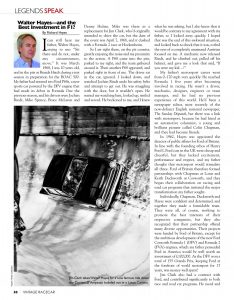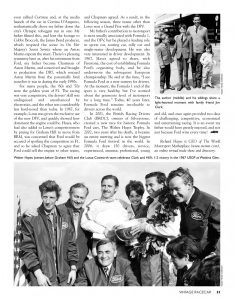Walter Hayes and the best investment in F1?
Vintage Racecar
November 2007
Richard Hayes
courtesy and copyright of Vintage Racecar
http://vintageracecar.com
I can still hear my father, Walter Hayes, saying to me: “Sit there and do not, under any circumstances, move.” It was March 1968, I was 10 years old, and in the pits at Brands Hatch during a test session in preparation for the BOAC 500. My father had entered two Ford P68s, a new sportscar powered by the DFV engine that had made its debut in Formula One the previous season, and their drivers were Jochen Rindt, Mike Spence, Bruce McLaren and Denny Hulme. Mike was there as a replacement for Jim Clark, who’d originally intended to drive the car, but the date of the event was April 7, 1968, and it clashed with a Formula 2 race at Hockenheim.
So I sat right there, on the pit counter, greatly enjoying the noise and my proximity to the action. A P68 came into the pits, parked to my right, and the team gathered round it. Then another P68 appeared, and parked right in front of me. The driver sat in the car, ignored. I looked down, and watched Jochen Rindt undo his safety belts and attempt to get out. He was struggling with the door, but it wouldn’t open. He sensed me watching him, looked up, smiled and waved. He beckoned to me, and I knew what he was asking, but I also knew that it would be contrary to my agreement with my father, so I looked away quickly. I hoped that was the end of of this awkward situation, and looked back to check that it was, to find the eyes of a completely unamused Austrian focused on me. A mechanic now released Rindt, and he climbed out, pulled off his helmet, and gave me a look that said “if you were my kid….!”
My father’s motorsport career went from 0-170 mph very quickly: he reached Formula One five years after becoming involved in racing. He wasn’t a driver, mechanic, designer, engineer or team manager, and he had no previous personal experience of this world. He’d been a newspaper editor, most recently of the now defunct English national newspaper, The Sunday Dispatch, but there was a link with motorsport, because he had hired as an automotive columnist a young and brilliant pioneer called Colin Chapman, and they had become friends.
In 1962, Hayes was appointed the director of public affairs for Ford of Britain. In line with the founding ethos of Henry Ford I, Ford cars in the UK were cheap and cheerful, but they lacked excitement, performance and respect, and my father thought that motorsport would stimulate all three. Ford of Britain therefore formed partnerships with Chapman at Lotus and Keith Duckworth at Cosworth, and they began their collaboration on racing and road car programs that initiated the major transformation my father sought.
Individually, Chapman, Duckworth and Hayes were confident and determined, and together they made a formidable team. They were all, of course, working to promote the best interests of their respective companies, but they also recognized that their partnership offered many diverse opportunities. Their projects were funded by Ford of Britain, except for the ambitious development of the new Ford Cosworth Formula 1 (DFV) and Formula 2 (FVA) engines, which my father persuaded Ford in America would be well worth an investment of £100,000. As the DFV won a total of 155 Grands Prix, keeping Ford at the forefront of world motorsport for 17 years, it was money well spent.
Jim Clark also had a cobtract with Ford, and contributed significantly to both race and road car progams. He raced and even rallied Cortinas, and at the media launch of the car in Cortina D’Ampezzo, enthusiastically drove my father down the city’s Olympic toboggan run in one. My father filmed this, and lent the footage to Cubby Broccoli, the James Bond producer, which inspired the scene in On her Majesty’s Secret Service where an Aston Martin repeats the stunt. There’s a pleasing symmetry here as, after his retirement from Ford, my father became chairman of Aston Martin, and conceived and brought to production the DB 7, which rescued Aston Martin from the potentially fatal nosedive it was in during the early 1990s.
For many people, the ‘60s and ‘70s were the golden years of Formula One. The racing was very competitive, the driver’s skill was undisguised and unenhanced by electronics, and the ethos was considerably less hard-nosed than today. In 1967, for example, Lotus was given the exclusive use of the new DFV, and quickly showed how dominant the engine could be. Hayes, who had also added to Lotus’s competitiveness by paying for Graham Hill to move from BRM, was concerned that Ford would be accused of spoiling the competition in Formula One, and so he asked Chapman to agree that Ford could sell the engine to other teams, and Chapman agreed. As a result, in the following season, three teams other than Lotus won a Grand Prix with the DFV.
My father’s contribution to motorsport is most usually associated with Formula One, and the DFV, but he played a leading role in sports car, touring car, rally car and single-seater development. He was also very interested in driver development. In 1967, Hayes agreed to share, with Firestone, the cost of establishing formula Ford’s organising body, and he also underwrote the subsequent European championship. He said at the time: “I see Formula Ford as a new nursery for drivers. At the moment, the Formula 1 end of the sport is very healthy, but I have worried about the grassroots level of motorsport for a long time. Today, 40 years later, Formula Ford remains invaluable to drivers across the world.
In 2001, the British racing drivers club (BRDC), owners of Silverstone, created a new race for historic Formula Ford cars, The Walter Hayes Trophy in 2002. In 2002, two years after his death, it became an entire meeting and is now the biggest Formula Ford festival in the world. Int 2006, it drew 150 drivers, novice, experienced, amateur, professional, young and old, and once again provided two days of challenging, competitive, economic and entertaining racing. It is an event my father would have greatly enjoyed, and not just because Ford wins every time.


